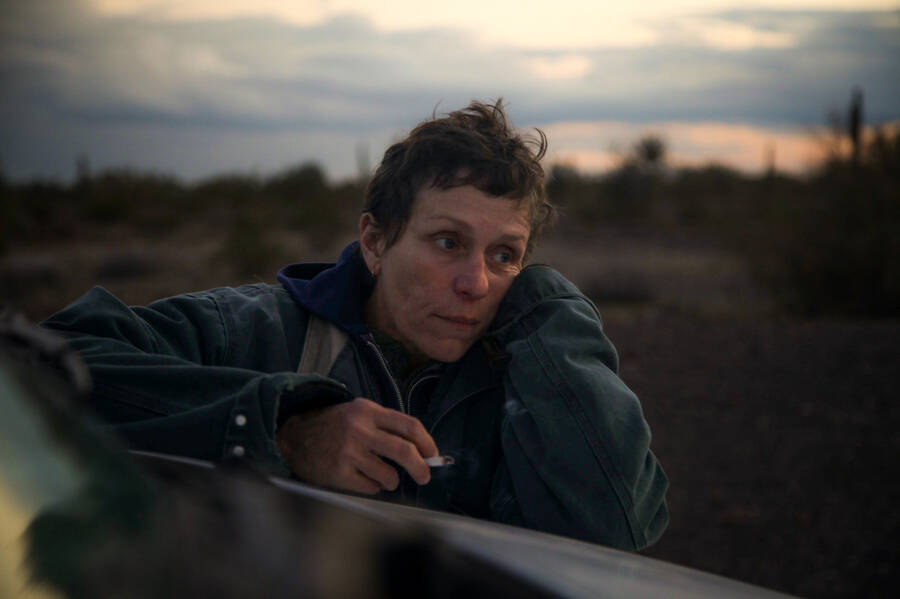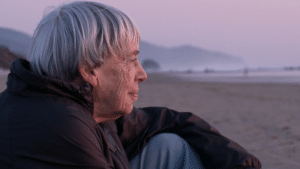Originally published in In These Times
For much of the past decade, we reported on the human fallout of the Great Recession, crisscrossing the country in a white Corolla nicknamed Cloud 9. We saw collective hope and action in Occupy Wall Street, in low-wage workers organizing and in a home-foreclosure defense movement.
There was desperation, too. Families in California pilfered napkins from McDonald’s for toilet paper. Warehouse workers near Chicago squatted in abandoned homes. Couples in Kentucky scraped by on $25 a week for food. Many workers were in dire shape: cancer, advanced diabetes, respiratory problems. Frank, a 37-year-old factory worker in Indiana, had survived three heart attacks. Randal, an ailing 61-year-old retiree in Oklahoma, was trying to eke out four more years of life so his wife, a Walmart worker, could qualify for his pension.
What would these workers think of Nomadland, the award-winning film by Chloé Zhao that’s in the running for six Oscars — including the coveted Best Picture title — at the April 25 Academy Awards?
The film is based on the similarly named book by reporter Jessica Bruder. After the Wall Street casino went bust, Bruder took to the highway as well, in a white van named Halen. She profiled “nomads” — some who play themselves in the film — reduced to living out of vehicles after losing jobs, savings, homes. They faced “impossible choices”: food or dental work, mortgage or electric bill, car payment or medicine. But they embraced the minimalist lifestyle: “You have a choice — you can be free, or you can be homeless,” says one.
It’s a tiny subculture, as little as a few thousand people who are hired by campgrounds and Amazon, “the most aggressive recruiter” of nomads. It’s not an option for the vast majority of workers. Staying close to doctors can be a matter of life and death. Many are caring for young kids or elderly parents, or helping the next generation through college.
Then there are the nomads that Zhao and Bruder do not show in the imagined Nomadland. As of 2019 in Los Angeles alone, where most unhoused people are Black or Latino, more than 16,000 people were living out of their automobiles. When Bruder finally notices that people of color are “a micro-minority in the subculture,” she neither explores why nor acknowledges other nomadic communities of people of color, like Latino migrant workers.
Zhao’s adaptation weaves facts from the lives of real nomads with the fictional story of Fern, played by Frances McDormand. Struggling with grief over her long-dead husband, Fern leaves Empire, Nev.— a real company town that nearly collapsed after the Great Recession — and joins the nomad life of gig work. The film lyrically portrays Fern letting go of the past and conventional burdens with wordless reveries, wild panoramas, floating naked in a river and gazing at towering redwoods.
But to make the on-screen fantasy feel real, the real lives of nomads become fantasy. Fern doesn’t struggle with injury or illness or fatigue or shame. Most of her time is leisure, not labor: makeshift spas, wildlife tours, park hikes, campfires, star watching. The cost of working the sugar-beet harvest in Nebraska is the dirt washing off Fern’s neck. The reality for Bruder, “in reasonably good shape” in her thirties, was harsher. Of her first full shift, she writes, “My whole body hurt.” Injuries were common. Most workers quit.
The film does show Linda May, a real-life nomad who plays herself, confronting impossible options. Faced with living on $550 a month, she considers suicide by booze and propane stove. But the many tales of monetary woes in Bruder’s book are otherwise ignored. One character’s stint in the hospital for a serious illness resolves without bills or money. Other nomads in the movie are motivated by individual grief like Fern, not economic woes: the loss of parents to cancer, a son to suicide.
Fern turns down offers of housing, culminating in her rejection of a gorgeous communal homestead on a Mendocino hilltop filled with family, farm animals and laughter. Fern chooses to be a nomad.
In the real world, many nomads desperately want a house. One admits “there is not so much difference between” the van dweller and the homeless person. By making Fern’s story one of personal responsibility and freedom, the movie erases the causes of the nomads’ economic pain. Individual suffering becomes individual triumph; the crisis of capitalism is also the solution.
If nomads are refugees from the subprime mortgage crash, the perilous landscape they travel was shaped by the tectonic social upheavals that began in the Reagan era. Fern’s exile from Empire, owned by a gypsum-mining company, is a nod to the deindustrialization that accelerated under Reagan. The landscape of permanent homelessness that nomads exist in was born of Reagan gutting funds for social welfare and cities. Nomads trade leads on jobs flipping burgers at tourist spots and cleaning toilets in national parks like they trade can openers for potholders at desert meetups. Gig work is another Reagan-era legacy; his assault on organized labor made it easier for corporations to expand contingent labor.
In the film, Amazon becomes as natural as the land. Wide-angle shots of the Amazon warehouse make it appear to rise up like the mountains in the Nevada desert. It is a neutral feature on the terrain that one can only navigate, not change.
To film inside a warehouse, the producers “made it clear” to the trillion-dollar corporation that Zhao’s “never going in with her films with an agenda.” The tradeoff leaves Amazon’s agenda front and center. It tells nomads they can “make new friends and reacquaint with old ones, share good food, good stories and good times.” It doesn’t tell them, as Bruder describes, of injuries incurred, anti-union lectures from management, and “Orwellian slogans, including ‘Problems Are Treasures,’ ” plastered on walls.
Gone is the Linda May of the book, who excoriates Amazon as “probably the biggest slave owner in the world” and declares, “I hate this fucking job.” (Adding insult to injury, Linda May, playing an edited version of herself in the film, is shown scanning goods — with no mention of the excruciatingly painful repetitive stress injury she incurred from this work in real life.)
“There is no alternative” to an economy that crushes people as easily as it does gypsum. There are only personal choices and quirks. Some people are wired differently, some are brave pioneers, some choose to be homeless. America is a place where defining your own future is always possible— yet, somehow, forever down the road.










